Filed under: Community Organizing, Featured, Indigenous, Repression, Solidarity, Southern Mexico
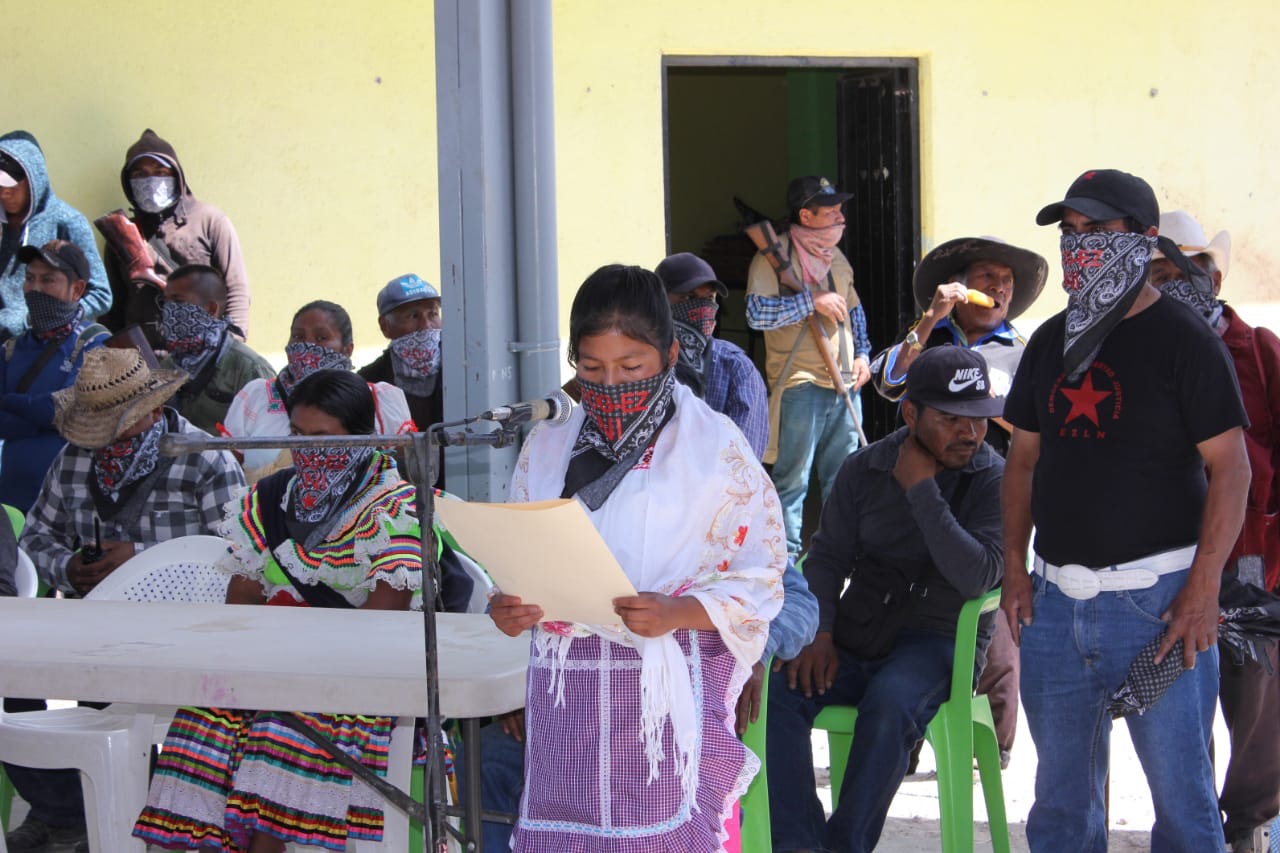
Last week, Its Going Down and Radio Zapote carried out a collective interview with a member of the Popular Indigenous Council of Guerrero-Emiliano Zapata (CIPOG-EZ)—an Indigenous organization working from within various communities in the Montaña Baja Region of Guerrero, Mexico, who are struggling for autonomy and self-determination amidst an unbearable climate of capitalist, state, and narco violence.
The interview covers the history and development of the organization, its organizational forms and political goals, its thoughts on political parties and the state, along with its relationship to other social struggles in the state and country. These topics are taken up from within a context of tremendous violence, where communities belonging to CIPOG-EZ live under a continuous narco-paramilitary siege, with the constant threat of arrest, disappearance, or assassination.
Below we publish the audio interview in Spanish, along with an edited text version translated into English. The Spanish text is below.
Can you tell us a little bit about the history of your organization?
Since 2008, we have been organized as the Popular Indigenous Council of Guerrero – Emiliano Zapata (CIPOG-EZ), although our history of resistance goes back 500 years. The CIPOG-EZ is a house of the people: a political organization which was born to accompany our peoples and our assemblies. We seek to be a space where we can listen to each other and question ourselves. It is the center of analysis, reflection, debate, and comradery among our peoples, with respect for the autonomy of communities, organizations and individuals. As Na Savi, Me ́pháá, Nahua, and Ñamnkué Indigenous peoples of the state of Guerrero, we began to fight for our autonomy and self-determination in 1992, forming the Guerrero Council of 500 Years of Resistance. This organization grew with the emergence of the Zapatista Army of National Liberation (EZLN) and joined the National Indigenous Congress (CNI), the home of all Indigenous peoples of Mexico. We fought for the recognition of Indigenous rights and culture in the constitution.
In the Costa Montaña of the state of Guerrero, our communities have developed new forms of communal governance, building our own institutions. In 1995, the Community Police were created, followed in 1998 with the founding of the Regional Coordinator of Community Authorities (CRAC). These modes of organization and self-governance weren’t invented. They form part of our history and derive from five centuries of Indigenous resistance, and our experiences as Indigenous peoples.
With these community institutions, we showed that in these mountains, between the misery and repression in which we are submerged, we are capable of recovering peace and tranquility. This form of communal government brought to life the Regional Assembly of Communal Authorities and the horizon of constructing a communal territory.
However, with money, projects, governmental positions, and other promises, the bad governments put an end to the Guerrero Council of 500 Years of Resistance. Many leaders were bought off and ended up alienated from the people. Later, by taking advantage of the interests of opportunist groups, a similar attempt was made to destroy the communal system of security and justice (CRAC-PC).
Money also led groups of community police and commissioners to abandon the spirit of service to the people. The people themselves recognize the dedication, sacrifice, and risks of the community police, because not just anyone confronts criminals without pay.
That is why we had to build other forms of communal organization for the good of the community and not for the good of the few. A key example is our communal system of security and justice that has gone through several iterations of construction and critical reflection, from the Community Police, the Regional Coordinator of Community Authorities (CRAC), the Regional Assembly of Community Authorities, to the Regional Coordinator of Community Authorities Founding Pueblos (CRAC-PC-PF).
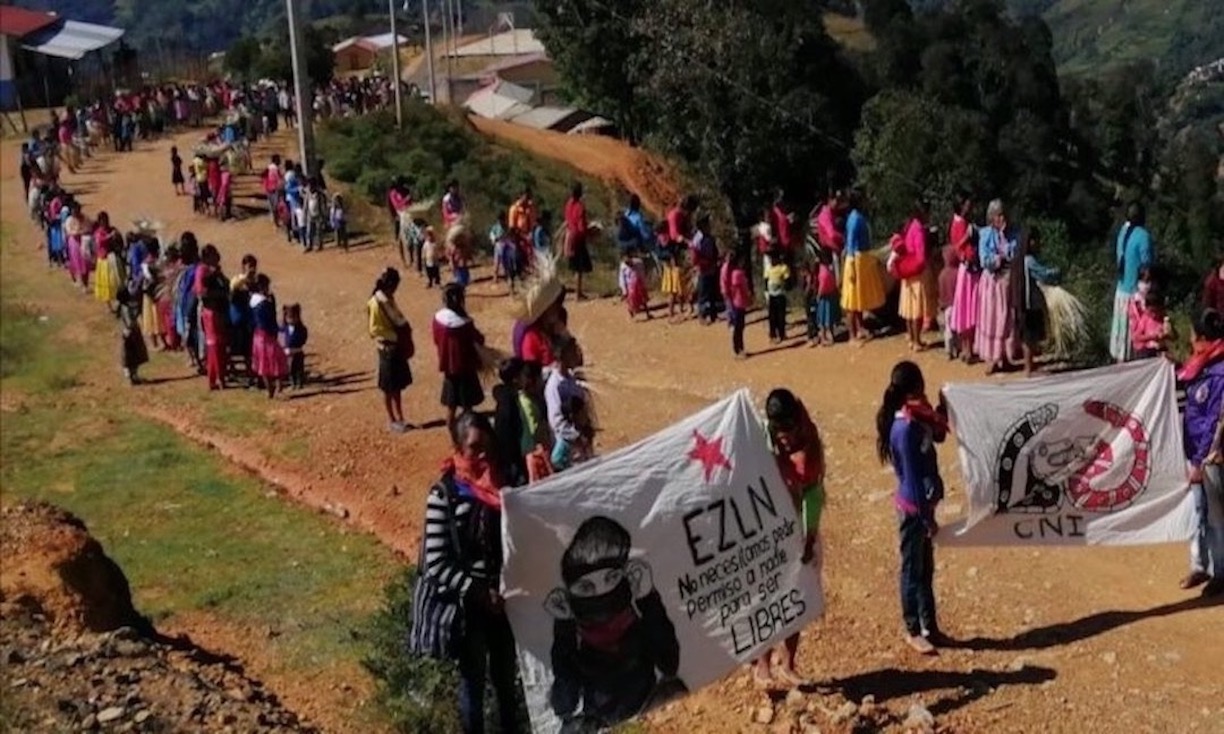
What are the CIPOG-EZ’s objectives? What do you work for?
The CIPOG-EZ works with simple and humble people, who are dignified and honest. Not to tell them what they must do, but to take their voice into account and think about how we can continue as Indigenous peoples. To build an organizational network that, taking into account the voice of the people, answers questions to act responsibly in the struggle of our peoples and builds proposals to resist the war of extermination waged against native peoples.
We want to strengthen our communal forms of life, relations of respect and mutual aid. Not to manage governmental projects, but to instead ask ourselves: What can we construct with our own efforts? What can we construct with the organizational force that surges from the people, when through discussion, agreements are reached and proposals and organization grow?
The CIPOG-EZ seeks to be a small home, a space of listening and dialogue between the people.
We accompany the communities and their assemblies with the following principles:
- No to making agreements from above to be imposed on those below.
- Yes to constructing agreements to organize ourselves from below.
- No to negotiating deals behind the backs of those who will actually carry them out.
- Yes to taking into account the opinion of everyone who participates.
- No to seeking gifts, positions, or public office.
- Yes to seeing beyond the government windows.
The CIPOG-EZ walks below, with Indigenous peoples, and in the face of the capitalist system that dispossesses, exploits, despises, and represses us. As Indigenous peoples we recover the principles that we inherited from the struggles of our peoples:
- Lead by obeying.
- Propose, don’t impose.
- Build, don’t destroy.
- To work from below, not to seek to rise.
- To convince, not conquer.
- Represent, not supplant.
- To serve others, not serve oneself.
We seek autonomy and self-determination. This in the face of the contempt we have lived through for the past 500 years of Mexican history, and the many distant periods in which we have never been treated as more than those who must contribute our blood and sweat so that a small group can keep their power. We also train organizers who promote cultural awareness in the communal assemblies and the rights of Indigenous people to defend our communities and build a dignified future in our territories. We do not work, nor have any dealings, with political parties.
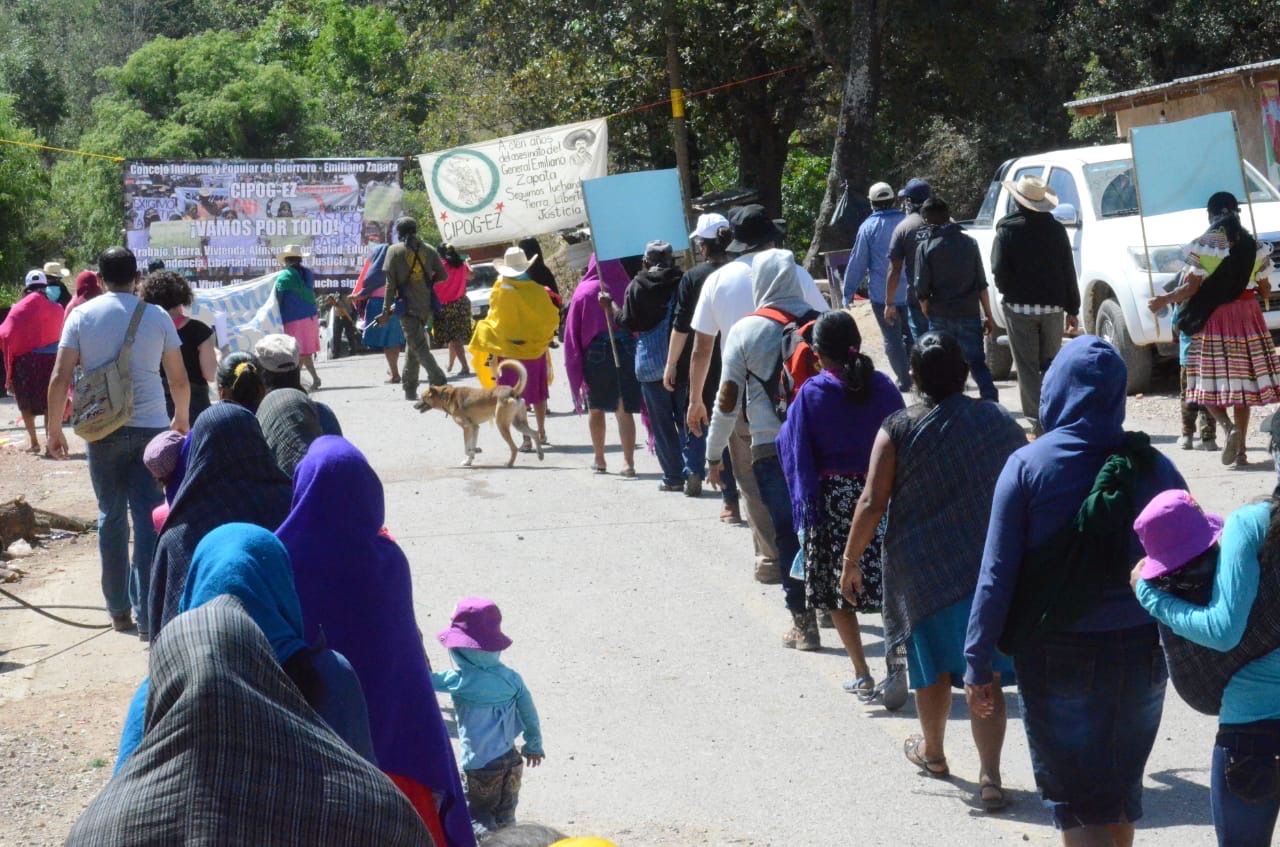
What led you all to get organized?
In the different regions of the state, we experience distinct problems. In the Montaña Alta region, we face the dispossession of our land by mining companies like Diana, CAMSIM, the British HOCHSCHILD. These mining projects effect our communities’ communally held lands in Páscala de Oro, Iliatengo, Tierra Colorada, San Miguel el Progreso, Tenamazapa, Pueblo Hidalgo, Colombia de Guadalupe, Totomixtlahuaca, Mixtecapa, Acatepec and Malinaltepec.
In the Montaña Baja region of Guerrero, in the 24 communities that make up the CIPOG-EZ, we are experiencing extermination at the hands of narco-paramilitary groups – Los Rojos and now Los Ardillos – who assassinate, kidnap, disappear, torture, and impose a reign of terror in the communities. The most basic human rights are violated every day and have been violated for years, to the extent that boys and girls, men and women, and the elderly, live in constant terror that they will be next to join the long list of the dead written in our blood.
Despite facing different problems, we have seen that the logic by which they dispossess and murder us is the same: alliances between the bad government at the federal, state, and municipal level, national and transnational companies, and groups of organized crime. Therefore, our horizon is the search for autonomy and self-determination, just as the brothers of the EZLN have shown is possible and we, the peoples who make up the CNI and the CIG, have decided to pursue.
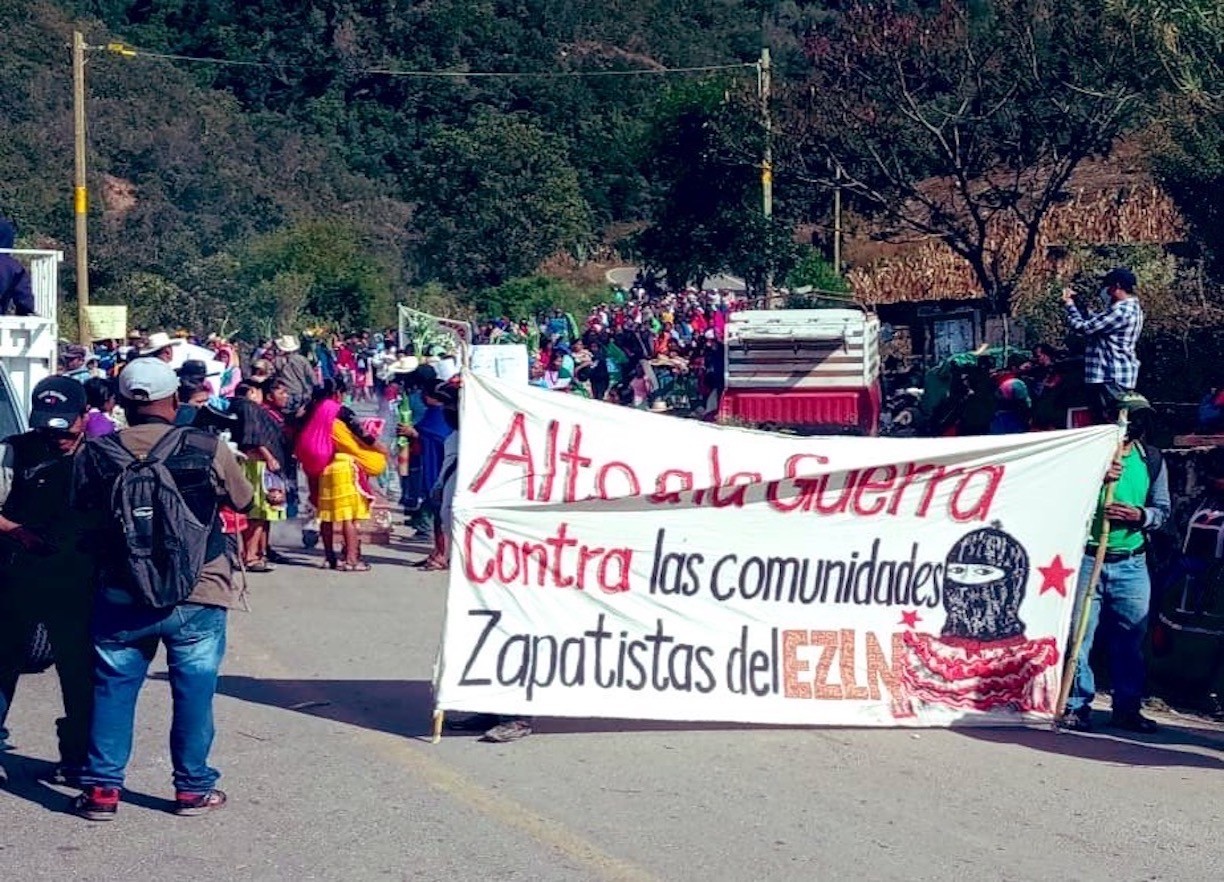
What histories nurture and inspire you?
We are nurtured and inspired by the resistance of the peoples of Mexico. The injustice in this country has been historic, but the resistance and rebellion of the oppressed has also been historic. Thus, we can go back to prehispanic times and the resistance to Spanish domination to say that since their arrival in 1521, we, the Indigenous peoples, have resisted. Since the arrival of the Spanish until today, others have tried to exterminate us and impose their vision of the world, dispossess us of our territories and identities. Thus, as Indigenous peoples, we have opposed the extermination and we will continue to do so. Future generations will know they must resist and fight against extermination, so that inspiration is the result of the contempt we experience.
But, beyond resisting, we have learned to build. Comrades, know that we as Indigenous people have our own forms of political, economic, cultural, and social organization, forms we ourselves have created. And just as the bad governments oppress us and impose their vision of the world, Indigenous peoples resist and create to reaffirm our own forms. This is why our Zapatista brothers and sisters are among those that nurture us, as they have followed a path and carried out other experiences and practices which we look towards to strengthen our own processes.
What ethnic groups make up the CIPOG-EZ?
In the Costa Montaña, Costa Chica, Montaña Alta y Montaña Baja, the Na Savi, Me ́pháá, Nahua, Ñamnkué, and Afromexican peoples live together, and together experience the contempt, plunder, exploitation, and repression of capitalists allied with the bad governments and organized criminal groups.
What does the situation faced by the CIPOG-EZ in Guerrero tell us about the relationship between the state and organized crime?
The increase in violence and the systematic attacks coincide with the moment in which the organized crime group, Los Ardillos, appeared with more force in the socio-political structure of the State of Guerrero. Since 2015, this group has maintained political, economic and territorial control of the municipalities of Chilapa de Álvarez and José Joaquin de Herrera and is directly connected to political parties and authorities at the local, state, and federal levels of the government.
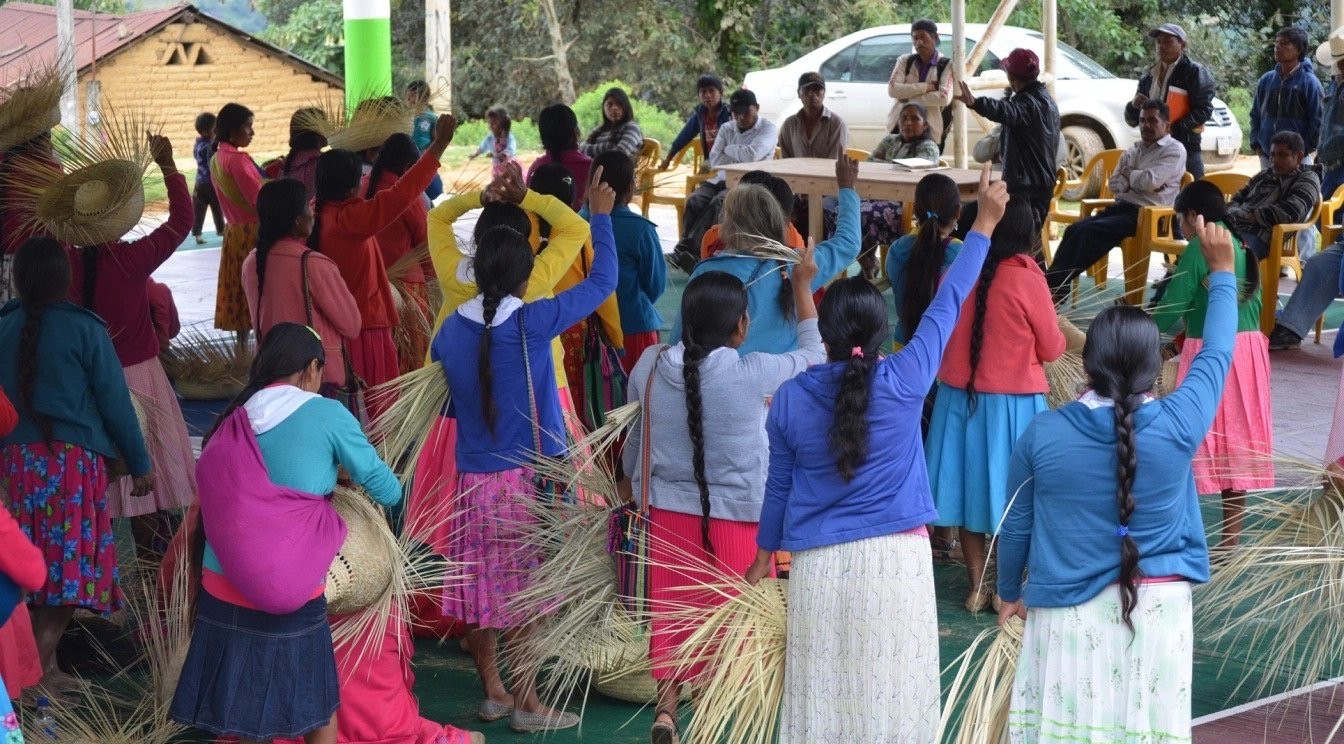
What is it like to organize in the context of such brutal violence?
It is very difficult because we have to be alert at all moments. We resolve one issue and already face another one. However, the fact that the communities are the ones resisting, and that they don’t give up and continue resisting, motivates us all to continue resisting even if it doesn’t make it any easier.
Can you share with us what you have endured and how you have organized against it?
The life in our communities has changed due to the psychological terror we have been subjected to for many years. However, since 2015, in addition to the psychological issues, we have faced other things, like the constant killings, persecutions, imprisonments, kidnappings, torture, extermination, forced displacement, and forced disappearance of people.
The CIPOG-EZ belongs to the National Indigenous Congress (CNI) and works with other organizations like the O.C.S.S. and the CRAC-PC-PF. Can you talk about theses connections and how you all work together?
In 2014, dozens of communities of the Na Savi, Me’phaa, and Nahua Indigenous peoples announced the creation of two Houses of Justice of the Regional Coordinator of Community Authorities – Community Police – Founding Pueblos (CRAC-PC-PF). One located in Rincón de Chautla in the municipality of Chilapa de Álvarez, in the central region of Guerrero, and the other in Santa Cruz del Rincón, in the municipality of Malinaltepec, in the mountain region. This happened within the larger context of an organizational division in 2013 driven by the state, which led to an internal split in the CRAC-PC and from which emerged the CRAC-PC-PF.
Both CIPOG-EZ in 2008 and CRAC-PC-PF in 2014, have publicly committed to the path and principles of the National Indigenous Congress (CNI). Although both organizations maintain the communal assemblies as the heart of their decision-making, CRAC-PC-PF represents the sphere of security and justice, while CIPOG-EZ carries out political and community work for the reconstitution and free self-determination of the peoples. In this sense, each organization maintains a particular structure and objectives. And if we have relations with other organizations, it is always with respect to their forms of organization.
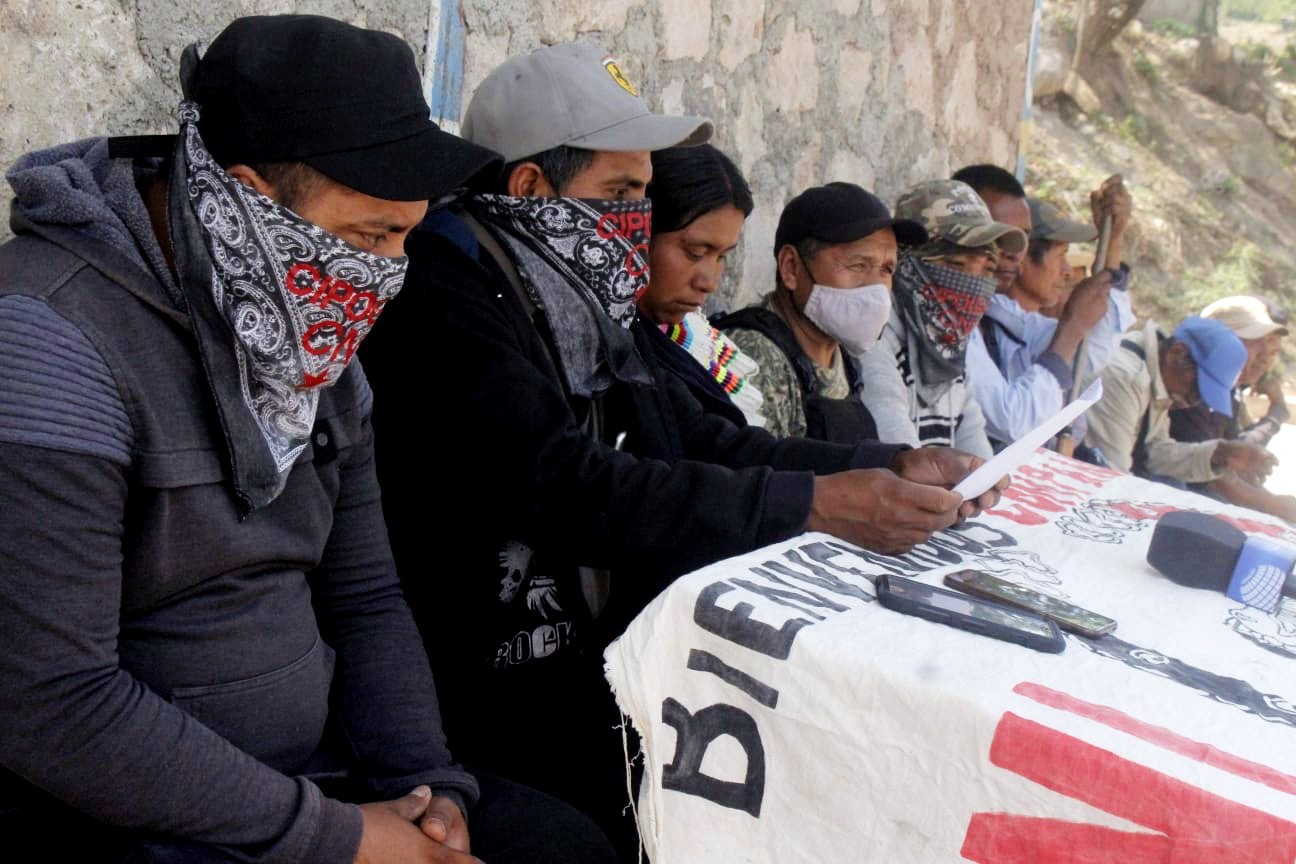
What is your opinion of the state, political parties, and MORENA?
It is a reality that there isn’t any difference between the political parties. They all have a common origin, that is, they all want to have power and to impose themselves over the will of the people. Additionally, all of them are aligned with capitalism. As our Zapatista brothers and sisters have already explained, capitalism rides on its four wheels, dispossession, repression, disdain, and exploitation. Thus, when political parties come to power, they reveal an underlying economic power that rules. They destroy mother earth, the mountains, rivers, jungles, forests, seas, and persecute those who resist this destruction. We could name every single crime of the PRI, the PAN, and now MORENA, but the example of our brother Samir Flores who fought against the construction of an ecologically destructive thermoelectric plant will suffice. For defending the earth, and thus life itself, he was murdered in the doorway of his own house. Before becoming president, Andrés Manuel López Obrador promised to stop the construction of the thermoelectric plant. But when he came to power, he proved he was lying and with his words of contempt for the opponents of the megaproject, he condemned our brother Samir Flores.
For those listening to this interview from nearby or from afar, what can we do to support you all, and to show our solidarity with your struggle?
As CIPOG-EZ, we have worked on various projects to strengthen our communities. However, due to state and narco-paramilitary violence, we have had to slow down. One of the most representative projects of CIPOG-EZ is the “House of Knowledges.”
With this project, we seek to have a community space where boys, girls, men and women, grandfathers and grandmothers, of all the different communities can have access to education and training in five principal areas:
- Agroecology
- Arts and Crafts
- Production and Internal Economy
- Community Health
- Community Communication
In this sense, the “House of Knowledges” is thought of as a community space, where there is no discrimination, where the lack of basic studies does not impede learning, nor formation, in areas that are essential for community development. It is a space where Indigenous people can have access to another type of education, at the same time that they carry out productive activities which allow them to construct a dignified life.
Those who are listening to this interview, they can get in touch with CIPOG-EZ, and lend a hand to help this project, whether they are comrades who can share knowledge, material resources, or physical labor.
Support for this project is one of the most necessary, but equally, the dissemination of our struggle, making visible our denunciations and the incapacity of the bad governments. These gestures also help us feel like we are not alone.
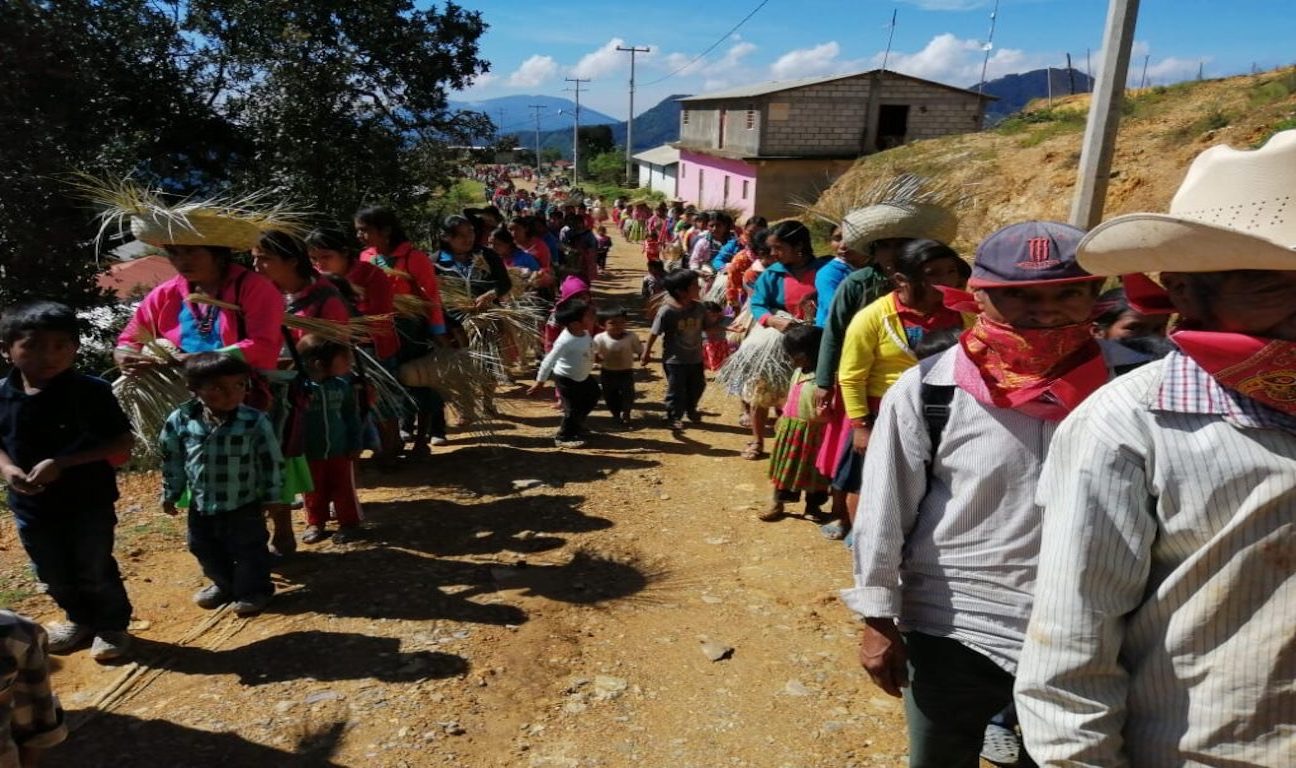
What is the best way in which the people can keep up to date with your organization and your struggle?
As part of the National Indigenous Congress, our activities and denunciations are posted by our brothers and sisters on their webpage. Thus, you can follow the webpage of the National Indigenous Congress. There you can maintain informed about our struggle. Not only ours, but the same violence that we live, is taking place in all of the towns and communities of the CNI.
What are your thoughts on the visit of Andrés Manuel López Obrador to Chilapa?
For us, Andrés Manuel López Obrador is the continuity of past governments, maintaining the logic of contempt and dispossession against Indigenous people and communities. At the same time, he tries to silence us, to quiet our pain with social programs, just as the PRI and the PAN did before. There is no difference, they only change the name of the social programs but the idea is the same. They simulate that they are doing their work, and like that, maintain their power. At the same time, to justify megaprojects like the Mayan Train, Morelos Integral Project, and the Interoceanic Corridor.
We told AMLO clearly: Do not try to trick us. Our pains and demands are not for your games. We know the social programs that again and again you are presenting in our communities continue to be handouts that the governments want to give us, thinking they can buy and silence us with their programs like “Sembrando Vida,” “60 y mas,” “Jovenes Construyendo el future,” “Credito ganadero a la palabra,” and others.
As Indigenous peoples belonging to the CIPOG-EZ, we do not struggle for political positions, and much less for handouts or “well-being” programs. We struggle for life, because narco-paramilitary groups operate in complicity with the three levels of government. That is what the powerful do not like. They expect us to kiss them on the hand, and to be thankful for the crumbs that they leave in Guerrero and throughout Mexico. But no, we know well what they want. The serious thing about all of this, is that they come and promote their social programs knowing the context of our communities. We have told them how the narco-paramilitary groups operate who have us under siege. We have told them who commands these groups, and they continue like nothing is happening. We do not understand how the government of whatever political party, including the contemporary one, seeks to resolve the country’s problems by handing out crumbs when we have gone years saying it, demanding it, shouting it. When are they really going to listen? Not only that, when will truth and justice for our assassinated, tortured, disappeared, and displaced brothers and sisters be achieved?
We say, does it seem to you that the country is doing well? In Guerrero, like in other states of the country, there are thousands of people who are displaced due to the proliferation of organized crime. What good is a social program if the criminals are lurking around the corner to extort and assassinate us?
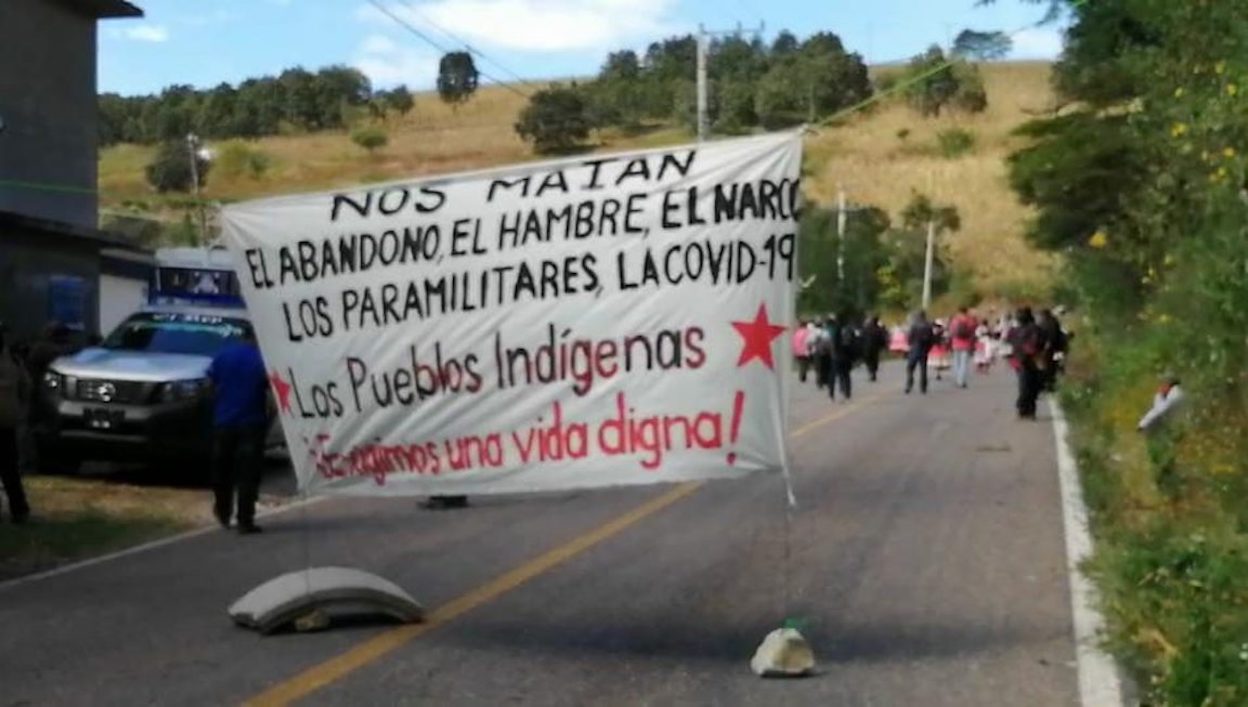
What can you tell us about the recent arrest of the compañero Samuel Virgenio on July 13 of this year?
It is important to mention this case. It serves as an example for those listening of what we have lived through for various years. It exemplifies the manner in which the bad state and municipal governments have aligned with criminal groups to demobilize us and to terrorize our communities. Imagine having to leave your neighborhood, or the place where you live, out of fear of being assassinated and arrested. Well, that’s what we live with daily. Many of our compañeros of the organization have arrest orders against them for false accusations and denunciations made by the criminal groups or police. Then, leaving our communities is a risk. Even if the criminal groups don’t kill or disappear us, the police detain us and turn us over to the criminal groups, or they arrest and extort us. It is for this reason that we organize. As an organization, we mobilized quickly on July 13, to pressure the bad government of the state to free our compañero, Samuel Virgenio Germán, pertaining to the community of Rincón de Chautla and the CIPOG-EZ.
To give another example, since 2015, there are active arrest warrants against 67 compañeros and compañeras who were threatened by the criminal group “Los Rojos.” After having been threatened by the criminal group, the government of Guerrero issued arrest warrants against the victims. These warrants continue active, yet they still haven’t been able to arrest us. Today, some solidarity lawyers are supporting us so that we can get rid of these arrest warrants.
Can you talk about the mobilizations and denunciations during the last electoral process: “Niños y niñas armados de Verdad” and the intermittent highway blockades that you all set up?
Prior to the electoral process, we carried out various actions. We want to make clear that it is not elections that motivate us. We have no intention of taking advantage of the electoral context to make our case. We mobilized due to the seriousness of the situation in our communities. One of the actions that we carried out in the face of the lack of response from the Mexican state to the violence in our communities was “Niños y niñas armados de verdad” or “Boys and girls armed with Truth” in Guerrero on April 30, 2021.
CIPOG-EZ does not promote girls and boys using arms to defend our communities, because it clearly violates the rights of children. The name that we put on the activity, makes reference to the truth as a weapon, which boys and girls use to name the root of the violence they are experiencing: the narco-paramilitary group, Los Ardillos. The same truth that the municipal, state, and federal governments have not resolved in spite of the denunciations which have been made on many occasions.
This activity caused our communities to be the target of different civil, religious, state, and federal government organizations, for possible “violations” of the rights of children. For example, the President Andrés Manuel López Obrador said, “Not with children” “Those who live by the gun, die by the gun.” I hope those who are listening to this interview realize that, once again, the government questions our activities, but doesn’t address the causes that lead the communities to carry out this type of activity
Thus, on April 30, 2021, we carried out a massive march. At the front was a contingent of hundreds of boys and girls who shouted “justice”. The majority of these boys and girls are victims of attacks and aggressions carried out against their parents, uncles, and other family members, the constant attacks these children live through on part of the narco-paramilitary group, Los Ardillos.
We also carried out intermittent highway blockades to demand the intervention of the state to end the violence. Beginning on May 28, state authorities approached us. The governor, Héctor Astudillo Flores, promised to appear and carry out working groups on June 9, 2021, together with representatives from each community that makes up CIPOG-EZ. These workshops were to be held in the “Casa de Guerrero” in Chilpancingo.
This was a proposal from the state government, due to the fear that our road blockades would prevent the installation of polling stations for the June 6 election in the communities of the Montaña Baja of Guerrero. However, when the date of the workshops arrived, we were not received. In other words, it is pure lies with the bad government.
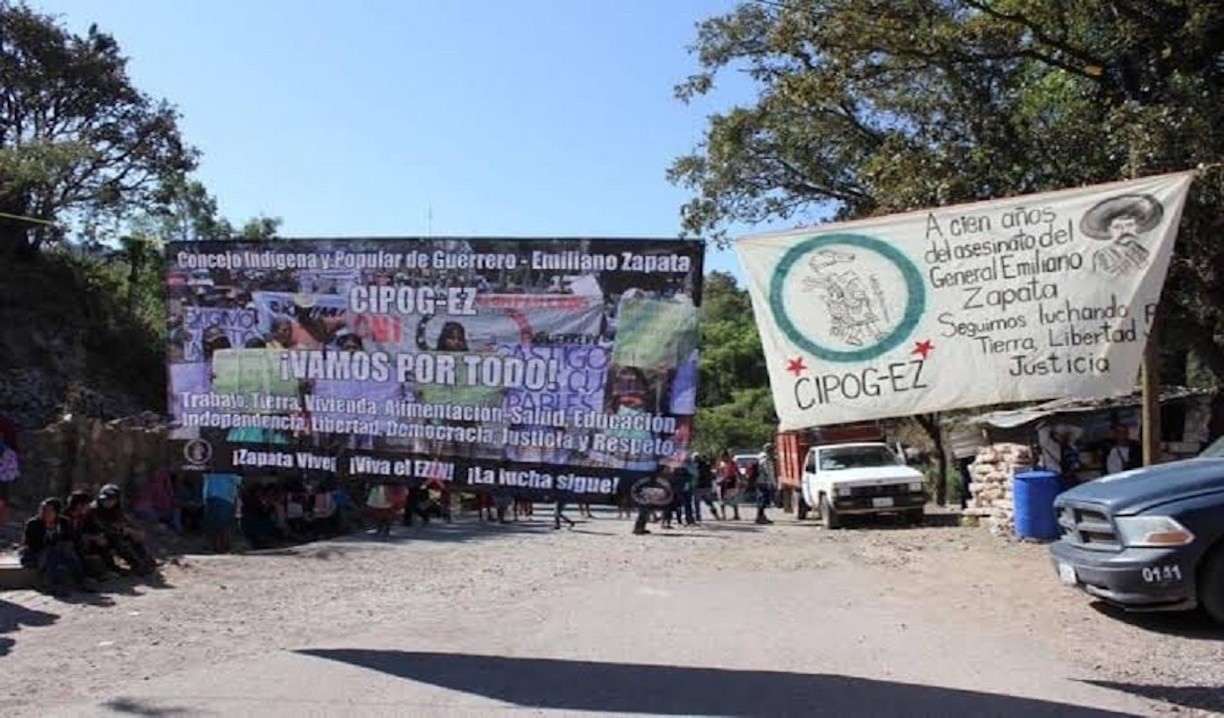
En Español
La semana pasada, Its Going Down y Radio Zapote realizaron una entrevista colectiva con un miembro del Consejo Indígena y Popular de Guerrero-Emiliano Zapata (CIPOG-EZ), una organización indígena que trabaja desde varias comunidades en la Región de Montaña Baja de Guerrero, México. Que luchan por la autonomía y la autodeterminación en medio de un clima insoportable de violencia capitalista, estatal y narco.
La entrevista cubre la historia y el desarrollo de la organización, sus formas organizativas y objetivos políticos, sus pensamientos sobre los partidos políticos y el Estado, asimismo su relación con otras luchas sociales en el estado y en el país. Estos temas se plantean desde un contexto de violencia extrema, en el que las comunidades pertenecientes al CIPOG-EZ viven bajo un continuo asedio narcoparamilitar con la constante amenaza de arresto, desaparición o asesinato.
A continuación publicamos la entrevista de audio en español, junto con una versión textual.
¿Puedes hablarnos de la historia de su organización?
Nos organizamos en el Consejo Indígena y Popular de Guerrero-Emiliano Zapata desde 2008, aunque nuestra historia de resistencia va 500 años atrás.
El CIPOG-EZ como casa de los pueblos; es una organización política que nace para acompañar a nuestros pueblos, a nuestras asambleas, busca ser una pequeña casa donde podamos escucharnos, preguntarnos, cuestionarnos. Es el centro de análisis de reflexión, de debate y hermandad entre nuestros pueblos, con respeto a la autonomía de las comunidades, las organizaciones y las personas.
Los pueblos Na Savi, Me´pháá, Nahua y Ñamnkué de Guerrero que desde 1992 comenzamos a luchar por nuestro derecho a la autonomía y libre determinación, constituimos el Consejo Guerrerense 500 años de Resistencia que creció con el surgimiento del Ejército Zapatista de Liberación Nacional y se articuló con el Congreso Nacional Indígena, la casa de todos los pueblos indios de México. luchamos para que los Derechos y la Cultura indígena fueran reconocidos en la constitución.
En la Costa Montaña de Guerrero nuestras comunidades llevaron a la práctica nuevas formas de gobierno comunitario, constituyendo sus propias instituciones. Nació la Policía Comunitaria en 1995 y la Coordinadora Regional de Autoridades Comunitarias en 1998. Estos modos de organización y de gobierno no fueron inventados, forman parte de nuestra historia y vienen de cinco siglos de resistencia indígena y de nuestras experiencias como pueblos.
Así se demostró que, en estas montañas, entre la miseria y la represión en la que nos han tenido sumidos, los pueblos somos capaces de recuperar la paz y la tranquilidad. Esta forma de gobierno comunitario le dio vida a la Asamblea Regional de Autoridades Comunitarias y el horizonte de construir un Territorio Comunitario.
Sin embargo, con dinero, proyectos, puestos en el gobierno y promesas, los malos gobiernos acabaron con el Consejo Guerrerense 500 años de resistencia. Muchos dirigentes se vendieron y terminaron alejados del pueblo. Luego con dinero también quisieron destruir el Sistema Comunitario de Seguridad y Justicia (CRAC-PC), aprovechando los intereses de grupos oportunistas.
Y fue por dinero que grupos de policías y comisarios se alejaron del espíritu de servicio al pueblo, donde los mismos pueblos reconocen la entrega y el sacrificio por el riesgo que corren los Policías Comunitarios, porque no cualquiera se enfrenta a delincuentes sin ningún pago a cambio
De ahí que tuviéramos que buscar construir otras formas de organización comunitaria para el bien de la comunidad y no de unos cuantos. Ejemplos de ello es el Sistema de Seguridad y Justicia Comunitaria que ha pasado por varias etapas de construcción y reflexión, tales como la Policía Comunitaria, la Coordinadora Regional de Autoridades Comunitarias, la Asamblea Regional de Autoridades Comunitarias y la Coordinadora Regional de Autoridades Comunitarias Pueblos Fundadores, es así como nos encontramos hasta ahora.

¿Cuáles son los objetivos del CIPOG, para qué trabaja?
El CIPOG-EZ se propone trabajar con la gente sencilla y humilde pero honesta y digna. No para decirles qué van a hacer, sino para tomar en cuenta su palabra y pensar cómo podemos seguir caminando como pueblos. Construir una red organizativa que, tomando en cuenta la palabra de la gente, responda a preguntas para actuar con responsabilidad en la lucha de nuestros pueblos y para construir propuestas para resistir a la guerra de exterminio contra los pueblos originarios.
Queremos fortalecer nuestras formas de vida comunitaria, las relaciones de respeto y apoyo mutuo. No para gestionar proyectos de gobierno, para eso ya hay muchos, nosotros nos preguntamos y preguntamos: qué podemos construir con nuestras propias fuerzas, con la fuerza organizativa que levantan los pueblos cuando desde la palabra nace el acuerdo y crecen las propuestas y la organización.
El CIPOG-EZ busca ser una pequeña casa donde podamos escucharnos y hablar entre pueblos. No viene a prometer nada, viene a preguntar y a escuchar. No sigue el calendario electoral ni la gestión de proyectos del mal gobierno, no trabaja ni tiene tratos con partidos políticos.
Camina con las comunidades y sus asambleas con los siguientes principios:
- No hacer acuerdos arriba para imponer abajo.
- Sí construir acuerdos para organizarnos desde abajo.
- No negociar movimientos a espaldas de quienes los hacen.
- Sí tomar en cuenta la opinión de todos los que participan.
- No buscar regalitos, posiciones ni puestos públicos.
- Sí ver más lejos que las ventanillas del gobierno.
El CIPOG-EZ camina abajo, con los pueblos indios y frente al sistema capitalista que nos despoja, explota, desprecia y reprime. Como pueblos originarios recuperamos los principios que nos heredaron las luchas de nuestros pueblos:
- Mandar obedeciendo.
- Proponer y no imponer.
- Construir y no destruir.
- Bajar y no subir.
- Convencer y no vencer.
- Representar y no suplantar.
- Servir y no servirse.
Buscamos la autonomía y la libre determinación, frente al desprecio que por más de 500 años hemos vivido en las distintas etapas de la historia de México, en la que nunca figuramos más que como quienes ponen la sangre para que un pequeño grupo se quede con el poder. También buscamos formar a promotores y promotoras que promueven la conciencia en la asamblea comunitaria/comunal y derecho de la cultura Indígena para defender nuestras comunidades y construir un futuro digno en nuestros territorios, no trabajamos ni tenemos tratos con partidos políticos.

¿Qué los llevó a organizarse?
En las distintas regiones vivimos problemáticas distintas, como el despojo de nuestras tierras en la Región Montaña Alta para entregárselas a las compañías mineras tales como la Diana, CAMSIM, inglesa HOCHSCHILD, que afectaría a las comunidades de bienes comunales, Páscala de Oro, Iliatengo, Tierra Colorada, San Miguel el Progreso, Tenamazapa, Pueblo Hidalgo, Colombia de Guadalupe, Totomixtlahuaca, Mixtecapa, Acatepec y Malinaltepec. En la Montaña Baja de Guerrero, las 24 comunidades que se organizan en el CIPOG-EZ, vivimos el exterminio por parte de los grupos narco-paramilitares, Los Rojos y ahora Los Ardillos, que asesinan, secuestran, desaparecen, torturan y mantienen el terror en las comunidades. Los derechos humanos más básicos se violan todos los días y así ha sido durante años, de tal forma que niños, niñas, hombres y mujeres, abuelos y abuelas, viven con el temor de ser los siguientes en la larga lista de muertes escrita con nuestra sangre. Pero, a pesar de que las problemáticas son distintas, hemos visto que la lógica con la que nos despoja y nos matan es la misma, alianzas entre los malos gobiernos federal, estatal y municipal, empresas nacionales y trasnacionales y grupos de la delincuencia organizada. De ahí que en nuestro horizonte se encuentre la búsqueda de la autonomía y la libre determinación, tal como los hermanos del EZLN nos han mostrado que es posible y como lo hemos decidido los pueblos que conformamos al CNI y al CIG.
En las distintas Regiones vivimos problemáticas distintas, como el despojo de nuestras tierras en la Región Montaña Alta para entregárselas a las compañías mineras tales como la Diana, CAMSIM, inglesa HOCHSCHILD, que afectaría a las comunidades de bienes comunales, Páscala de Oro, Iliatengo, Tierra Colorada, San Miguel el Progreso, Tenamazapa, Pueblo Hidalgo, Colombia de Guadalupe, Totomixtlahuaca, Mixtecapa, Acatepec y Malinaltepec. En la Montaña Baja de Guerrero, las 24 comunidades que se organizan en el CIPOG-EZ, vivimos el exterminio por parte de los grupos narco-paramilitares, Los Rojos y ahora Los Ardillos, que asesinan, secuestran, desaparecen, torturan y mantienen el terror en las comunidades. Los derechos humanos más básicos se violan todos los días y así ha sido durante años, de tal forma que niños, niñas, hombres y mujeres, abuelos y abuelas, viven con el temor de ser los siguientes en la larga lista de muertes escrita con nuestra sangre.
Pero, a pesar de que las problemáticas son distintas, hemos visto que la lógica con la que nos despoja y nos matan es la misma, alianzas entre los malos gobiernos federal, estatal y municipal, empresas nacionales y trasnacionales y grupos de la delincuencia organizada. De ahí que en nuestro horizonte se encuentre la búsqueda de la autonomía y la libre determinación, tal como los hermanos del EZLN nos han mostrado que es posible y como lo hemos decidido los pueblos que conformamos al CNI y al CIG.

¿De qué historias se nutren e inspiran?
Nos nutrimos e inspiramos de la resistencia de los pueblos de México. La injusticia en el país ha sido histórica, como histórica ha sido también la resistencia y rebeldía de quienes hemos sido oprimidos. Entonces podríamos ir a la época prehispánica y la resistencia en contra del dominio español, para decir que es desde aquellos años, 1521, que los pueblos resistimos, pues es desde la llegada de los españoles hasta la fecha actual, que otros pretenden exterminarnos, e imponernos su visión del mundo, despojarnos de nuestros territorios e identidad. Entonces, nosotros como pueblos nos hemos opuesto al exterminio y lo seguiremos haciendo, entonces las nuevas generaciones sabrán que hay que resistir y luchar en contra del exterminio, es así que la inspiración es resultado del desprecio.
Pero, además de resistir, hemos aprendido a construir. Sepan compañeros y compañeras que los pueblos tenemos formas de organización política, económica, cultural y social, propios, creadas por nosotros y nosotras. Y así como los malos gobiernos nos oprimen e imponen su visión del mundo, los pueblos resistimos y creamos para reafirmar nuestras propias formas. Es así que los hermanos y hermanas del EZLN forman parte de aquellos que nos nutren, pues han caminado otras experiencias y prácticas que miramos para fortalecer nuestro propio proceso.
¿Qué grupos étnicos conforman al CIPOG?
En la Región Costa Montaña, Costa Chica, Montaña Alta y Montaña Baja, los pueblos Na Savi, Me ́pháá, Nahua, Ñamnkué y Afromexicanos convivimos y vivimos el desprecio, despojo, explotación y represión de los capitalistas aliados de los malos gobiernos y de los grupos de la delincuencia organizada.
¿Qué nos dice la situación de Guerrero y el CIPOG sobre el estado y su relación con el crimen organizado?
El incremento de la violencia y los ataques sistemáticos coincidieron con el momento en el que Los Ardillos, aparecen con más fuerza en el entramado socio-político del Estado de Guerrero. Este grupo controla política, económica y territorialmente desde 2015 los municipios de Chilapa de Álvarez y José Joaquín de Herrera, y está directamente vinculado a partidos políticos y a las autoridades de los tres niveles de gobierno.
Y de cómo se vincula el crimen organizado con el Estado; pues miren compañeros y compañeras, la omisión, silencio y complicidad del gobierno federal, quién a pesar de conocer la situación y generar una serie de acuerdos para la atención de la problemática, no ha cumplido con su mandato de garantizar una vida digna a todos los habitantes, ni siquiera nos nombra, ni menciona lo que vivimos, no hace nada contra los delincuentes, al contrario, se vuelve en contra nuestra. Es claro que hay una relación y acuerdos entre el crimen organizado y el Estado.

¿Cómo es organizarse en un contexto de violencia tan terrible?
Es muy difícil, porque estamos todo el tiempo alerta, y resolvemos un asunto y ya tenemos otro encima. Sin embargo, el hecho de que las comunidades sean las que están resistiendo y no se rajan y resisten, si bien no lo vuelve más fácil, sí nos estimula a todos y todas a seguir resistiendo.
¿Pueden compartir con nosotrxs lo que han soportado y cómo se han organizado contra ello?
La vida de nuestras comunidades ha cambiado por el terror psicológico al que se encuentran sometidas desde hace muchos años, pero más recientemente desde 2015; además de la cuestión psicológica, hay otras cosas, como los constantes asesinatos, persecuciones, encarcelamientos, secuestros, torturas, situación de exterminio, desplazamiento forzado y desaparición forzada de personas.
El CIPOG-EZ pertenece al CNI y trabaja con otras organizaciones como la OCSS y la CRAC-PC-PF, ¿nos pueden hablar de esas conexiones y de cómo trabajan todos juntos?
En 2014, decenas de comunidades de los pueblos indígenas Na Savi, Me´phaa y Nahua anuncian la creación de dos Casas de Justicia de la Coordinadora Regional de Autoridades Comunitarias – Policía Comunitaria – Pueblos Fundadores (CRAC-PC-PF), una en Rincón de Chautla, Mpo. de Chilapa de Álvarez, en la región Centro y otra en Santa Cruz del Rincón, Mpo. de Malinaltepec, en La Región Montaña. Estos hechos suceden dentro de un contexto más amplio de división que inició desde 2013 impulsado por el Estado y que forzó a la división interna de la CRAC-PC y de la cual nace la CRAC-PC-PF.
Tanto el CIPOG-EZ en 2008 como la CRAC-PC-PF en 2014, han declarado públicamente caminar con los principios del Congreso Nacional Indígena (CNI), y aunque ambas organizaciones mantienen en el seno de su toma de decisiones a la asamblea de comunidades, la CRAC-PC-PF representa la esfera de la seguridad y la justicia, mientras que el CIPOG-EZ realiza trabajo político y comunitario por la reconstitución y la libre autodeterminación de los pueblos. En este sentido, cada organización mantiene una estructura y objetivos particulares. Y si tenemos relación con otras organizaciones, siempre es con respeto a sus formas de organización.

¿Cuál es su opinión sobre el Estado, los partidos políticos, Morena?
Es una realidad que no hay distinción entre los partidos políticos. Todos tienen un origen común, esto es, quieren tener el poder e imponerse por sobre la voluntad del pueblo. Además, todos están alineados al capitalismo, entonces como ya lo han explicado nuestros hermanos y hermanas del EZLN, el capitalismo anda sobre sus cuatro ruedas, el despojo, la represión, el desprecio y la explotación. Es así que los partidos políticos cuando llegan al poder demuestran que el poder económico es el que manda. Inician así la destrucción de la madre tierra, de los montes, ríos, selvas, bosques, mares, así como la persecución contra quienes se resisten a esa destrucción. Pudiéramos nombrar cada uno de los crímenes del PRI, del PAN y ahora de Morena, pero basta el ejemplo de hermano Samir Flores, quien fue asesinado en la puerta de su casa, por defender la tierra y con ello la vida, por oponerse a la termoeléctrica que tanto daño causará. Cabe decir que Andrés Manuel López Obrador, antes de ser presidente se comprometió a detener la construcción de la termoeléctrica, pero ya llegado al poder, demostró que mentía y con sus palabras de desprecio a los opositores, condenó a nuestro hermano Samir Flores.
Para que los que nos escuchan de cerca y desde lejos: ¿cómo podemos apoyarlos y manifestar nuestra solidaridad con su lucha?
Nosotros como CIPOG-EZ, hemos impulsado varios proyectos para fortalecer a nuestras comunidades. Sin embargo, tras la violencia que vivimos por parte del Estado y los grupos narco-paramilitares, nos hemos detenido. Uno de los proyectos más representativos en el de las “Casas de Saberes”.
Lo que buscamos con este proyecto es contar con un espacio comunitario al cual puedan acceder niños, niñas, hombres y mujeres, abuelos y abuelas de todas las comunidades, para su formación y capacitación en cinco áreas principalmente:
- AGROECOLOGÍA
- ARTES Y OFICIOS
- PRODUCCIÓN Y MERCADO INTERNO
- SALUD COMUNITARIA
- COMUNICACIÓN COMUNITARIA
En este sentido “Las Casas de Saberes” se sueñan como espacios comunitarios donde no haya discriminación, donde la falta de estudios básicos no impida el aprendizaje ni la formación en áreas que para las comunidades son indispensables para su desarrollo. Donde los pueblos originarios puedan acceder a otro tipo de educación, al mismo tiempo que llevan a cabo actividades productivas que les permitan construir una vida digna. Es así que estamos pidiendo a quienes nos escuchan, puedan acercarse al CIPOG-EZ y echar mano para echar a andar este proyecto, ya sean compañeros, compañeras, que puedan compartir sus saberes, así como los recursos materiales, y sus manos. Ese proyecto con el que soñamos es uno de los más necesarios, pero igual, la difusión de nuestra lucha, las denuncias y visibilización de la inoperancia de los malos gobiernos, también nos ayuda a no sentirnos solos, solas.

¿Cuál es la mejor manera de que la gente se mantenga al día con su organización y con su lucha?
Nosotros como parte del CNI, informamos de nuestras actividades, así como nuestras denuncias a nuestros hermanos y hermanas que se aglutinan en el CNI. Entonces pueden dar seguimiento a la página del Congreso Nacional Indígena y ahí enterarse de nuestra lucha y no sólo de la nuestra, pues la misma violencia que vivimos nosotros y nosotras, recorre a todos los pueblos y comunidades del CNI.
¿Que piensan sobre la visita de Obrador a Chilapa?
Para nosotros y nosotras, Andrés Manuel es la continuidad de los gobiernos anteriores, pues mantiene la lógica de desprecio y despojo hacia los pueblos y comunidades; al mismo tiempo, intenta silenciarnos, callar nuestros dolores con programas sociales, tal cual lo hizo el PRI o el PAN. No hay diferencia, sólo le cambian el nombre a los programas sociales pero la idea es la misma, simular que hacen su trabajo y mantener así su poder, al mismo tiempo que justificar los megaproyectos como el Tren Maya, el Proyecto Integral Morelos o el Corredor Interoceánico.
Entonces nosotros le dijimos claro: no nos trate de engañar, que nuestros dolores y demandas no están para sus juegos, sabemos que los programas sociales que una y otra vez va presentando en nuestras comunidades siguen siendo limosnas que nos quiere dar el gobierno, creyendo que nos logran comprar y silenciar con sus programas como “Sembrando vida”, “60 y más”, “Jóvenes construyendo el futuro”, “Crédito ganadero a la palabra” y otros tantos más.
Nosotros como pueblos originarios pertenecientes al CIPOG-EZ no luchamos por cargos públicos ni mucho menos por despensas o programas de “Bienestar”, nosotros luchamos por la vida, porque grupos narco-paramilitares operan con la complicidad de los tres niveles de gobierno. Y eso es lo que no les gusta a los poderosos, ellos esperan que les demos beso en la mano, que estemos agradecidos por las migajas que vienen a tirar a Guerrero y a todo México, pero no, nosotros y nosotras sabemos bien lo que quieren. Lo grave de todo esto, es que vienen y promocionan sus programas sociales sabiendo el contexto de nuestras comunidades, porque se lo hemos dicho, cómo operan y quiénes dirigen a los grupos narco-paramilitares que nos han cercado, pero hace como que no pasa nada; nosotras y nosotros no entendemos como los gobiernos de cualquier partido político, incluyendo al actual, pretenden resolver los problemas del país a través de la repartición de migajas cuando llevamos años diciéndolo, exigiéndolo, gritándolo. ¿Cuándo realmente nos va a escuchar? Y no sólo eso ¿cuándo habrá verdad y justicia para nuestras hermanas y hermanos asesinados, torturados, desaparecidos, desplazados?
Y decimos ¿le parece que el país va bien cuando en Guerrero como en otros estados del país hay miles de desplazados por la proliferación del crimen organizado? ¿De qué nos sirve un programa social si a la vuelta están los criminales acechando para extorsionarnos o asesinarnos?

¿Pueden contarnos sobre la detención del compañero Samuel Virgenio el 13 de julio de este año en curso?
Es importante mencionar este caso y que sirva de ejemplo para quienes nos escuchan de lo que vivimos desde hace años. La forma en la que el mal gobierno estatal y municipal, se han aliado con los grupos delincuenciales para desmovilizarnos y aterrorizar a nuestras comunidades. Se imaginan ¿salir de su colonia o del lugar donde vivan con el miedo de ser asesinado o encarcelado? pues eso vivimos todos los días. Muchas y muchos de nuestros compañeros de la organización, tienen ordenes de aprehensión por falsas acusaciones y denuncias hechas por los mismos grupos delincuenciales o bien por la policía. Entonces, salir de nuestras comunidades es un riesgo, pues si no nos matan, o desaparecen los delincuentes, nos detienen los policías y nos entregan a los delincuentes o bien, nos encarcelan y extorsionan. Por esto es que nos organizamos, ya como organización, nos movilizamos rápidamente ese 13 de julio para presionar al mal gobierno del estado y que liberara a nuestro compañero Samuel Virgenio Germán, perteneciente a la comunidad de Rincón de Chautla y al CIPOG-EZ. Para darles un ejemplo más, desde 2015 hay ordenes de aprehensión contra 67 compañeros y compañeras que fueron agredidos por el grupo delincuencial de “Los Rojos”; entonces, luego de haber sido agredidos por los delincuentes, el gobierno de Guerrero gira ordenes de aprensión contra las víctimas. Éstas órdenes siguen vigentes y aún nos han llegado a detener; hoy en día, unas hermanas y hermanos abogados nos están apoyando para que se puedan eliminar estas ordenes de aprehensión.
Las movilizaciones y denuncias que se llevaron a cabo durante el último proceso electoral: “Niños y niñas armados de Verdad” y bloqueos intermitentes.
Previo al proceso electoral, realizamos varias acciones, queremos dejar en claro que no es que nos movamos con las elecciones, que estemos aprovechando la coyuntura para salir a la luz; nosotras y nosotros nos movilizamos por la gravedad de la situación en nuestras comunidades. Es así que una de las acciones que realizamos ante la falta de respuesta del estado mexicano a la violencia, fue “Niños y niñas armados de Verdad en Guerrero” el 30 de abril de 2021.
El CIPOG-EZ, no promueve que los niños y niñas usen armas para defender a las comunidades pues es claro para ellos que atenta contra los derechos de los niños y niñas. El nombre que pusimos a la actividad, hacía referencia a la VERDAD como un arma que las niños y niñas estarían nombrando a raíz de la violencia que viven por el grupo narco-paramilitar Los Ardillos; la misma Verdad que los gobiernos municipales, estatales y federales no nos han resuelto a pesar de las denuncias hechas en muchas ocasiones.
La realización de esta actividad provocó que las comunidades fuéramos el blanco de diferentes organizaciones civiles, clericales, gobierno estatal y federal, por la posible “violación de los derechos de los niños”. Por ejemplo, el presidente Andrés Manuel López Obrador dijo: “Con los niños, no.” “El que ha hierro mata a hierro muere”. Ahí, espero que se den cuenta compañeros y compañeras que nos escuchan que, nuevamente el gobierno cuestiona la actividad, pero no nombra las causas que orillan a las comunidades a realizar este tipo de acciones.
Entonces el 30 de abril de 2021, realizamos una multitudinaria marcha, al frente iba un contingente de cientos de niños y niñas que gritaban “JUSTICIA”. La mayoría de estas niñas y niños son víctimas de los ataques y agresiones, han a sus padres, tíos o demás familiares por los ataques constantes que se viven por parte del grupo narco-paramilitar
Otra de las acciones en este contexto fueron los bloqueos carreteros intermitentes para demandar la intervención del estado para terminar con la violencia. A partir de la fecha 28 de mayo, previo al proceso electora, se tuvo un acercamiento por parte de las autoridades estatales; el gobernador Héctor Astudillo Flores se comprometió a presentarse y llevar a cabo mesas de trabajo conjuntamente con un representante de cada una de las comunidades que conforma el CIPOG-EZ en fecha 9 de junio de 2021, dichas mesas se llevarían a cabo en la Casa de Guerrero en Chilpancingo.
Lo anterior fue propuesto por el gobierno estatal por el temor de que se obstaculizara la colocación de casillas electorales el día 6 de junio, en las comunidades de la Montaña Baja de
Guerrero. Sin embargo, llegada la fecha de la reunión presencial con el Gobernador de Guerrero, no nos recibieron. O sea que puras mentiras con los malos gobiernos






